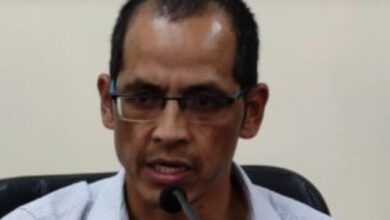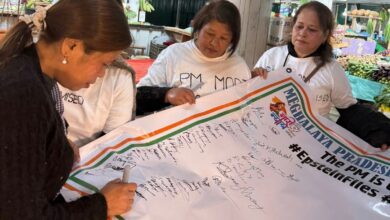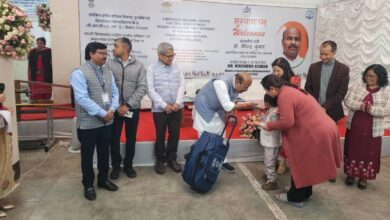Mental health problems of HIV patients need to be addressed
While NE states have inadequate trained mental health professionals, the new Meghalaya policy promises to provide a holistic solution

When V Suchiang and her two-year-old daughter were diagnosed with human immunodeficiency virus, or HIV, 12 years ago, she was devastated. It became difficult for her to accept the medical report and instantly the fear of death gripped her. “I developed anxiety and lost my appetite. There was sleeplessness too,” she told Sunday Monitor.
Suchiang, who works as a peer counsellor for persons living with HIV (PLHIVs), said the initial days were tough and she was mentally disturbed and lost focus. It took her several sessions of counselling to come to terms with reality.
Mental health problems are common in PLHIV, either post-diagnosis or during the course of medication. According to the National Institute of Mental Health, depression is one of the most common mental health conditions faced by PLHIV. “HIV and related infections can also affect the brain and the rest of the nervous system. This may change how a person thinks and behaves. Also, some medications used to treat HIV may have side effects that affect a person’s mental health,” it said.
In extreme cases, HIV patients also get suicidal, said Agui Daimei, co-founder of MSNP+ that works with PLHIV in Shillong and other parts of Meghalaya. Zonuntluanga Sangma (26), who was diagnosed in 2019, said he would get suicidal thoughts and would spend time praying in the church after he came to know about his HIV status. Currently, Sangma is associated with MSNP+ and his HIV status is “undetectable”, which means he cannot spread the virus, after antiretroviral therapy (ART).
When Daimei was diagnosed 16 years ago, she had to face a similar situation. Without anyone to talk to or seek support from, she became mentally disturbed and fought her depression alone. “I told myself that I have to live and there was no point dying every day like this. I gathered the strength to fight the disease. But not everyone can do that and some require counselling,” she said.
However, the amenities to provide complete support to patients for their mental health problems are inadequate in Meghalaya and other parts of the North East as well as the country. Less number of peer counsellors and clinical psychologists and trained psychiatrists often become a hindrance in providing support to PLHIV.
Need for more counsellors, psychologists
The factors which trigger mental health problems in PLHIV are manifold. The social stigma attached to the disease, the stress generated from the thought of disclosing the diagnosis in front of family and sexual partners, the fear of losing employment, the thought of a life-long medication and personal problems are some of the factors which lead to mental health problems in PLHIV.
“Any critical disease, including HIV, leads to mental distress. The thought of life-long treatment can be stressful,” said psychiatrist Dr Sonali Shinde Tesia.
Social stigma and lack of awareness make the situation worse. HIV infection is common among intravenous drug users and sex workers. “The causes (substance abuse and sex work) are as much a taboo as the disease. Adding to it is the social stigma about and lack of information on mental health problems,” said Daimei of MSNP+, an NGO supported by Vihaan.
The fear of ostracisation by society often prevents a PLHIV to seek help. MSNP+ has two peer counsellors, Daimei and Suchiang, who provide the required support. Apart from that, there are no psychiatrists and clinical psychologists. “However, we have counsellors at ICTC and ART centre who provide psychosocial support before testing, post-testing and also before the start of treatment,” said Dr B. Decruse, project director of Meghalaya AIDS Control Society.
The state has 222 Integrated Counselling and Testing Centres in government and private hospitals in Shillong and other districts.
There are no state government-appointed psychiatrists either and support for mental health problems of PLHIV is “need-based”. For instance, Suchiang said she refers patients with critical mental health problems to SANKER in Shillong.
Asserting that there are challenges in the absence of professional help, Decruse said, “Mental health problem is one of the increasing challenges we are facing from time to time. Clinical psychologists would really help the programme.”
According to the Integration of Mental Health and HIV Interventions study by UNAIDS and WHO, “Mental health conditions are associated with lower adherence to HIV treatment, increased risk behaviours, and lower engagement with HIV prevention.”
The study notes that support for mental health is a crucial component in the treatment of PLHIV and how it is often not integrated into the cycle of caregiving. In fact, one of the high-priority actions in the Global AIDS Strategy 2021-26 is the integration of mental health and psychological support in HIV treatment.
Eudora Warjri, senior advisor to Voluntary Health Association of Meghalaya, said not much importance is given to mental health issue, be it for PLHIV or substance abusers. “The OST (Opioid Substitution Therapy) programme in the state itself requires psychologists. Most mental health programmes in the state are general and lack specific intervention. If the mental trauma of PLHIV and drug users is not addressed, then the process of treatment remains incomplete and it becomes difficult to cure the individuals,” she added.
While both Daimei and Suchiang acknowledged the necessity of psychologists, they said PLHIV find it easier to open up to peer counsellors as “we set life examples”. The struggles of the peer counsellors and their successful treatment make patients at ease. The PLHIV also feel that the counsellors will understand them better without any stigma or prejudice.
When Suchiang met Agui after the former’s diagnosis, she said she was surprised to see another person living with the same condition and “I felt relieved and found strength in her”. Sangma too agreed. “December 29, 2019, was a black day for me. I was devastated and did not know how to reveal the news to my family. Of course, they were supportive. I got help from counsellors too who explained to me why I should go for ART and how I can live like any other person even being HIV positive,” he said.
Decruse echoed their views and said these counsellors are doing a commendable job. However, “a professional hand at the level of a clinical psychologist would go a long way in paving the path for handling mental health issues and they would be able to give appropriate insights to the counsellors in way and means to guide a PLHIV with mental health issues”, she said.
Keshav Lamsal of Kripa Foundation said he visits localities in Shillong and counsels substance users and alcoholics. He makes them understand the fallout of addiction and how those using intravenous drugs have a high chance of getting HIV.
Manbha Foundation provides pre and post-test counsellings to drug users who have contracted the virus. A staff member always accompanies PLHIV to the ART centre. “We have a counsellor for IDUs (intravenous drug users) and one for FSWs (female sex workers). What the state needs is a one-stop centre where all components of the treatment will be provided and patients can seek help for mental health problems too. Not many can afford to go to a private psychologist,” said Samanda Phanwar, project director at Manbha.
Dr KV Kishore, director at Banyan Academy of Leadership in Mental Health (BALM), said the 8-12 weeks after a person is diagnosed with HIV are crucial as that is the time when he or she will be suicidal.
“Peer counsellors are enough but during that period, an individual would require clinical evaluation. The chances of committing suicide during that time are high as the individual has received a bolt from the blue. It is, therefore, important that the person is given anti-depressant therapy along with a very special diet. A nutritious diet is very important because the individual experiences tiredness, excessive sleeping and cannot engage in productive activity,” said Kishore.
Vulnerable groups
Among the vulnerable groups are substance users. Shinde Tesia stressed the fact that counselling for drug users is important so that they are aware of HIV infection and its genesis. “HIV and addiction have a close connection. So, you have to keep a close watch on the population of drug users. They too require regular counselling. If we ignore them, then that will be another problem,” she said.
The psychiatrist also flagged the social problems faced by women suffering from HIV as the fear of acceptance by family and friends and social stigma is overwhelming.
The cases of female sex workers are also important as the group has little or no access to counselling. With no registration of sex workers in the state, it becomes difficult to trace those suffering from HIV. This raises the chances of spreading the virus.
Another vulnerable group is LGBTQIA+. Members of the LGBTQIA+, especially those who are into sex work, are highly prone to HIV infection, which adds to their already existing woes and stigma against them. In many cases, they find it difficult to seek medical intervention for mental health problems owing to the stigma they already face in society.
Shamakami, an NGO that works with the LGBTQIA+ community, has identified a few counsellors who are sensitive towards the issues of the community members and provide them support. A few clinical psychiatry interns also help the organisation. However, in the case of critical mental health problems, the individuals are referred to doctors outside the state.
According to Rebina Subba, co-founder of Shamakami and a lawyer, all psychiatrists in clinical practice can play a direct role in HIV prevention by including HIV testing in the routine evaluation of every patient.
“By encouraging routine HIV testing, psychiatrists can improve diagnosis in persons living with HIV and begin to normalise HIV testing. Awareness on HIV status through routine testing can lead to early initiation of ART and thus reduce morbidity,” she said.
“We have the necessary screening tools and efficacious treatments to treat mental health problems… But we need to prioritise mental health treatment with appropriate resources to address the current screening and treatment gaps. Integration of mental health screening and care into all HIV testing and treatment settings would not only strengthen HIV prevention and care outcomes, but it would additionally improve global access to mental healthcare,” added Subba.
Problems in North East
In other states of the North East too, there are lacunae in providing support to PLHIV when it comes to their mental health problems. The number of counsellors is too low and there is barely any psychologist involved.
Ningthoujam Roshan, technical specialist for adolescent health under Project Accelerate in Manipur, said nothing much has been done so far in the mental health aspect and “we have started a campaign on this”.
“Addressing mental health problems is a key component in addressing the HIV epidemic. We are planning a collaboration with the National Institute of Mental Health in this regard. We have three peer counsellors and one counsellor. One of our earlier counsellors had conducted a study that showed that children living with HIV undergo tremendous mental stress and that was one reason for which they would simply forget to take their medicines. This affected the treatment,” said Roshan.
Manipur has one of the highest prevalence of HIV in the country. A study showed high incidence of drug resistance (53%), emergence of recombinant virus (32%) and increased incidence of co-infection with Hepatitis C virus in the state. Roshan said a tool will be launched soon that will help in identifying patients with mental health problems.
In Mizoram too, the facilities are inadequate when it comes to addressing the mental health problems of PLHIV. There are four counsellors at the ART+ centre in Aizawl.
“I joined as a counsellor in 2016 and in all these years, I dealt with a few cases of PLHIV with psychological problems. I try to make them understand that there is nothing bad to be depressed and anyone can have the problem. I tell them how to tackle their anxiety and fear and that they should not blame themselves for their infection. For critical cases, I refer them to psychologists,” said Lalnunziri Vanchhawng, senior medical officer at the ART centre at Aizawl Civil Hospital.
Lalnunziri said counselling is also provided to the family members and sexual partners of PLHIV. “However, the problem is that not many patients want to disclose their HIV status to their wives or husbands or sexual partners. In that case, I counsel them for partner notification as this would prevent the disease from spreading,” she added.
A recent survey by the National AIDS Control Organisation (NACO) showed Mizoram has 10 times more HIV prevalence than the national level and pipped Manipur to become the first on the list. Over 23,000 people in Mizoram live with HIV. Nagaland is second with 1.45% of its population being infected by HIV.
Mental health policy & the way ahead
The Meghalaya government has recently introduced a mental health policy, a first of its kind among the northeastern states. The policy adopts a “transdisciplinary lens, beyond biomedical conceptualisations of mental health, to acknowledge other critical factors that shape health and well-being”.
The mental health problems of PLHIV are a focus area of the policy that looks to ensure an integrated intervention. According to NACO’s 2021 report, the percentage of adult HIV prevalence in Meghalaya is 0.42 and the total number of PLHIV is 8,692. The total number of annual new infections is 1,191. It is among the states which have adult HIV prevalence higher than the national average. It is among the states where less than one-third of the spouses or partners of HIV+ people have sought counselling and testing services. At this juncture, the policy and its implementation are of utmost importance.
The new policy points out the lack of human resources and trained personnel. “This is also true of the DMHP (District Mental Health Programme). While the programme works across all districts, it is not uniformly staffed owing to budgetary and personnel constraints. This also increases patients’ and families’ out-of-pocket expenditure,” it notes.
So, the policy aims to increase human resources, such as psychiatrists, psychologists and nurses. All medical officers and community health workers will be trained in assessing and assessing mental health issues. Sampath Kumar, principal secretary and commissioner in the state Department of Health and Family Welfare, said the process has already started and the first group of in-service doctors has been sent for a short course in psychiatry.
Shinde Tesia, who was part of the policy advisory team, said this is a good idea to increase manpower but those doctors should also have a keen interest in the subject. “It will help not just PLHIV but also other patients suffering from mental health problems. This is because the number of qualified mental health professionals and allied professionals is less in the state,” she added.
Among the other goals of the policy are to expand the mental health helpline, coordination across departments and policies under Human Development Council and creation of support groups under voluntary health centres guided by community health workers.
BALM’s Kishore, who was among the policy advisory team members, said the organisation can provide necessary training to make village child development centres self-sufficient and bridge the existing gap. “We have a general discussion about this with the state government but we have to have specific talks on this,” he added.
Kishore also informed that the state can approach the Centre for funds to strengthen resources.
To a query, Kumar said the Centre is already providing funds and the state government is also working with the World Bank for the state adolescence programme. The state government is planning an integrated approach to provide a holistic solution to mental health problems and is already working on the implementation plan for the mental health policy.
A NIMHANS team has also studied the issues specific to Meghalaya and developed training materials that can be completed online through its Digital Academy.
The policy also identifies substance users as a critical group and suggests measures to address their mental health problems. The DMHP currently has limited focus on the case of substance use and related mental health.
Mental health issue has always been a less-talked-about topic in the country. The Covid-19 pandemic brought the problem to the fore but there is more to be done to address it. Also, religion-related stigma and superstitions often increase the distress level of the vulnerable groups, including those who are non-HIV. But the problems are inter-related and need a holistic approach. Hence, the new policy is the right step forward but the state government has to ensure that its implementation is successful and the outcomes are sustainable. Also, besides the government departments, different sections of society, including religious establishments, should work hand in hand because as Shinde Tesia rightly pointed out that without focusing on any one issue, the others cannot be solved.
(Names of PLHIV mentioned with permission)
~ Team Sunday Monitor





